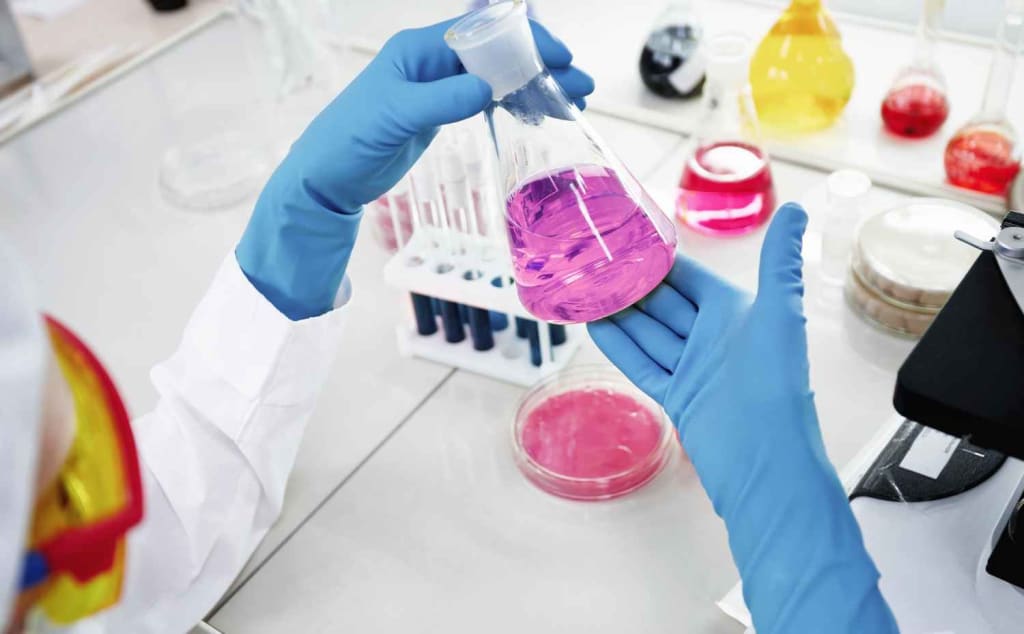Sustainable Practices in Modern Chemical Laboratories
Adopting Green Chemistry, Energy Efficiency, and Waste Minimization for a Sustainable Future

Introduction
Chemical laboratories are not an exception to the growing importance of sustainability in many businesses. Sustainable techniques are being incorporated into modern chemical laboratories—including those in Mumbai—to reduce their environmental effect, improve safety, and guarantee adherence to legal requirements such as FSSAI certification. This blog discusses the importance, use, and function of microbiology testing laboratories in the sustainable practices that modern chemical laboratories have embraced.
The Importance of Sustainability in Chemical Laboratories
For quality assurance, research, and development in a variety of industries, chemical laboratories are indispensable. They do, however, also generate a lot of toxic waste and consume a lot of resources. These labs may lessen their impact on the environment, save resources, and protect the community's and employees' health and safety by using sustainable practices.
Key Sustainable Practices in Chemical Laboratories
1. Green Chemistry
The goal of green chemistry is to create chemical processes and products that use fewer or no hazardous ingredients overall. Green chemistry ideas are being adopted by laboratories in Mumbai and other parts of the world in order to produce safer and more sustainable chemicals. This approach lowers disposal costs, increases worker safety, and minimizes environmental effect.
2. Energy Efficiency
Chemical laboratories are energy-intensive, primarily due to the need for maintaining precise conditions for experiments and storing sensitive materials. Implementing energy-efficient systems and equipment is crucial. This includes using energy-efficient fume hoods, lighting, and HVAC systems. Additionally, laboratories can conduct energy audits to identify and mitigate energy wastage.
3. Waste Minimization and Recycling
Proper waste management is vital in chemical laboratories to prevent environmental contamination and adhere to regulatory standards. Laboratories are adopting practices such as:
Source Reduction: Reducing the amount of waste generated at the source by optimizing experimental procedures.
Recycling and Reuse: Implementing programs to recycle solvents, plastics, and other materials. Some laboratories also use reusable glassware instead of disposable plastics.
Proper Disposal: Ensuring hazardous waste is disposed of correctly through certified disposal services.
4. Water Conservation
Water is a critical resource in chemical laboratories, used for cooling, cleaning, and as a solvent. Sustainable practices include:
Efficient Use: Installing flow restrictors on faucets and using water-efficient appliances.
Recycling Systems: Implementing systems to recycle water within the laboratory.
Rainwater Harvesting: Some laboratories are exploring rainwater harvesting to reduce reliance on municipal water supplies.
FSSAI Certification and Sustainable Practices
In India, FSSAI (Food Safety and Standards Authority of India) certification is crucial for laboratories involved in food safety testing. Laboratories in Mumbai seeking FSSAI certification must adhere to strict guidelines, including those related to sustainability. Sustainable practices not only help laboratories comply with these standards but also enhance their reputation and credibility.
1. Compliance with Environmental Regulations
FSSAI certification requires laboratories to comply with environmental regulations, including proper waste disposal and minimizing emissions. Implementing sustainable practices ensures compliance and avoids potential penalties.
2. Enhancing Efficiency and Reducing Costs
Sustainable practices often lead to increased efficiency and cost savings. For instance, energy-efficient equipment reduces electricity bills, while waste minimization lowers disposal costs. These savings can be significant for laboratories operating on tight budgets.
3. Building Trust with Clients and Stakeholders
Clients and stakeholders are increasingly concerned about sustainability. Laboratories in Mumbai that adopt sustainable practices and achieve FSSAI certification demonstrate their commitment to environmental responsibility, building trust and attracting more business.
Role of Microbiology Testing Laboratories in Sustainability
Microbiology testing laboratories play a critical role in ensuring the safety and quality of food, pharmaceuticals, and other products. These laboratories are also embracing sustainable practices to reduce their environmental impact.
1. Sustainable Testing Methods
Microbiology testing laboratories are adopting sustainable testing methods, such as:
Rapid Microbial Methods (RMM): These methods reduce the time and resources needed for testing, increasing efficiency and reducing waste.
Automated Systems: Using automated systems for sample processing and analysis reduces the need for manual intervention, minimizing errors and resource usage.
2. Waste Management
Proper waste management is crucial in microbiology testing laboratories due to the potential biohazard risks. Sustainable practices include:
Autoclaving: Sterilizing and reusing materials where possible.
Segregation: Properly segregating hazardous and non-hazardous waste to ensure safe disposal.
3. Energy and Resource Efficiency
Microbiology testing laboratories can reduce their environmental footprint by implementing energy and resource-efficient practices. This includes using energy-efficient incubators and refrigerators, as well as optimizing the use of consumables to minimize waste.
Case Study: Laboratories in Mumbai Leading the Way
Several laboratories in Mumbai are at the forefront of adopting sustainable practices. These laboratories are not only achieving FSSAI certification but also setting benchmarks for others to follow.
1. XYZ Laboratory
XYZ Laboratory in Mumbai has implemented comprehensive sustainable practices, including green chemistry, energy-efficient equipment, and robust waste management systems. Their commitment to sustainability has earned them FSSAI certification and recognition as a leader in the industry.
2. ABC Microbiology Testing Laboratory
ABC Microbiology Testing Laboratory focuses on sustainable testing methods and waste management. By adopting rapid microbial methods and efficient waste segregation, they have significantly reduced their environmental impact while maintaining high standards of quality and safety.
Conclusion
Sustainable practices in modern chemical laboratories are essential for reducing environmental impact, ensuring safety, and complying with regulatory standards like FSSAI certification. Laboratories in Mumbai are leading the way by integrating green chemistry, energy efficiency, waste minimization, and water conservation into their operations. Microbiology testing laboratories, in particular, are adopting innovative methods to enhance sustainability. By continuing to embrace these practices, chemical laboratories can contribute to a more sustainable future while maintaining high standards of quality and safety.
About the Creator
Enjoyed the story? Support the Creator.
Subscribe for free to receive all their stories in your feed. You could also pledge your support or give them a one-off tip, letting them know you appreciate their work.





Comments
There are no comments for this story
Be the first to respond and start the conversation.